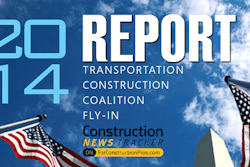There’s good news and bad news regarding AED’s ongoing efforts to save the federal highway program.
The good news is that lawmakers are finally waking up to the four-fold crisis facing the federal road, bridge and transit construction programs. We’re now seeing dim glimmers of recognition about what AED has been saying for months: the Highway Trust Fund (HTF) is going broke in late August, the HTF will be able to support no new investment in FY 2015 (putting and entire years’ worth of investment and $2.4 billion in equipment market activity in jeopardy), MAP-21 (the law authorizing annual highway investment) will lapse on Sept. 30, and the HTF faces a $365 billion revenue shortfall over the next two years.
The bad news is that most on Capitol Hill are still in denial about what it’s going to take to ultimately solve the problem. For evidence, look no further than the proposal by the House GOP leadership last week to permanently end Saturday postal deliveries and use the roughly $10 billion in savings to keep the highway program running until next spring. The proposal raised eyebrows among transportation advocates and across Capitol Hill. Senate Environment & Public Works Chairman Barbara Boxer (R-Calif.) was among the first to criticize the plan, saying that it was “unworkable, makes no sense and ignores the huge infrastructure needs we face.”
Not surprisingly, the National Association of Letter Carriers, which represents postal workers, was also highly critical: “Rather than offer Americans real solutions, House Leadership is once more seeking the easy way out. America can have strong, safe highway network without sacrificing a strong Postal Service. We shouldn’t be forced to choose between the two. GOP leaders need to go back to the drawing board.”
For AED’s part, we appreciate the fact that GOP congressional leaders now understand they have a crisis on their hands and are trying to solve it, but kicking the can down the road does nothing to address the highway program’s long-term structural problems, which stem from the simple fact that the money flowing into the HTF isn’t nearly sufficient to support the $50 billion per year the federal government spends on surface transportation. Patching the program for a few months by permanently ending Saturday delivery would only continue the historic uncertainty facing federal infrastructure programs. What we need is a long-term solution.
And that solution is pretty obvious: Raise the gas tax from 18.4 cents to gallon to 25 cents to restore its 1993 purchasing power (the last time it was increased) and index it to inflation going forward. A 2013 AED study showed that would not only solve the current problems, it would actually provide $167 billion more to investment over the next 20 years. Unfortunately, your elected officials on Capitol Hill are wringing their hands about the potential voter backlash from raising the gas tax. But would anyone really notice? It turns out gas prices have gone up more than 11 cents since three months. No one seems to be screaming.
Sen. Chris Murphy (D-Conn.) has provided a glimmer of hope that Congress may yet do the right thing. Last week he announced he was formally proposing a 12-cent gas tax increase to put the HTF back on solid fiscal footing. Was he berated by angry voters with pitchforks? Far from it. According to the New Haven Register, Murphy was joined at his press conference by supportive members of local chambers of commerce, labor groups, representatives from workforce programs and transportation and environmental advocates. The hope is that Murphy’s political bravery will inspire his congressional colleagues to test the waters on this issue.
In the meantime, it’s up to AED and its allies to continue to beat the drums on Congress to do the right thing. You can help by calling your senators and representatives and telling them to support Murphy’s proposal. The number for the congressional switchboard is 202-224-3121.



















